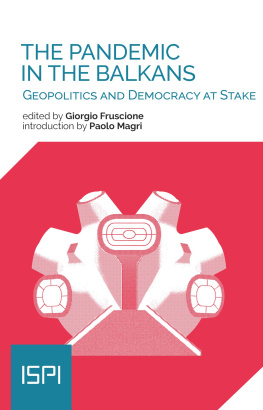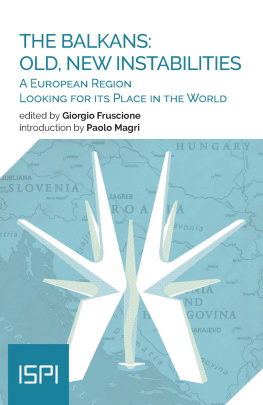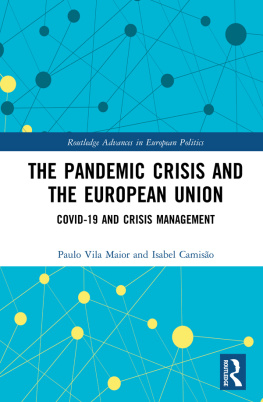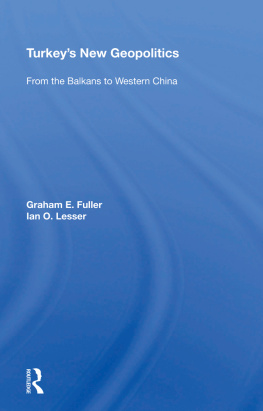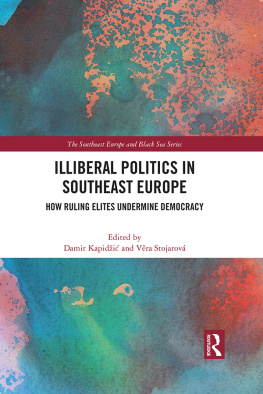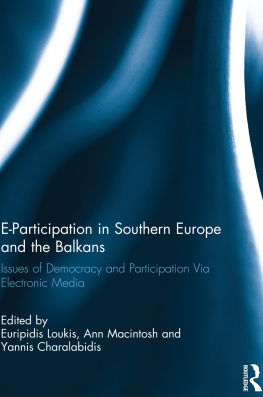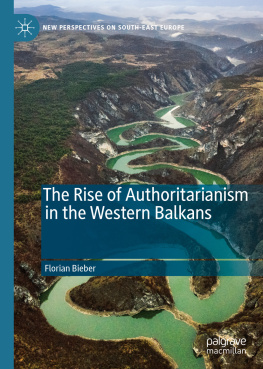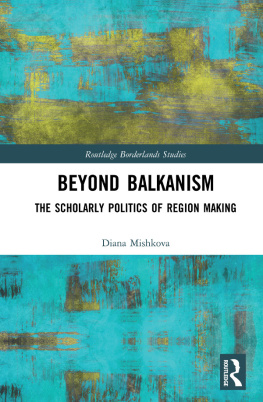2021 Ledizioni LediPublishing
Via Antonio Boselli, 10 20136 Milan Italy
www.ledizioni.it
The Pandemic in the Balkans: Geopolitics and Democracy at Stake
Edited by Giorgio Fruscione
Cover image by Francesco Fadani
First edition: April 2021
The opinions expressed herein are strictly personal and do not necessarily reflect the position of ISPI.
Print ISBN 9788855264716
ePub ISBN 9788855264723
Pdf ISBN 9788855264730
DOI 10.14672/55264716
ISPI. Via Clerici, 5
20121, Milan
www.ispionline.it
Catalogue and reprints information: www.ledizioni.it
Introduction
One year after it landed in Europe, the Covid-19 pandemic has left a deep mark on the Western Balkans. For this region as well as many others, it has proven to be a mark of continuity and change. More often than not, it has accelerated previous trends. And, for the Western Balkans, the effects of the pandemic have been playing out both at an international and at a regional scale.
For external actors looking at the Western Balkans, the pandemic has exacerbated geopolitical dynamics that had been ongoing for decades namely those involving the use of foreign assistance, be it official or unofficial aid, as a soft-power tool. External actors have changed their role and attitude towards the Balkan region, too. While the European Union has continued to be inconclusive, proceeding at a snails pace with its carrot-and-stick approach, China has seized on the opportunity and expanded its footprint. What first started as mask diplomacy turned into vaccine diplomacy, with Serbia being the first European country to receive one of the vaccines produced by Chinas Sinopharm, and set to become a producer of the vaccine itself later this year. For its part, Russia continues to strive to bolster its traditional partnerships, although Beijing appears to be ready to exploit Moscows economic weakness in assisting local allies. However, the pandemic has had deep consequences on domestic politics, too. The two keywords explaining local trends are continuity, on the one hand, and new hopes on the other. They both are on stage in the Balkans and are shaping the speed and direction of democratic transitions or consolidations, which remain far from complete.
These two interdependent dimensions of foreign interference and democratic retrenchment continue to plague the Balkan region, and have taken up renewed strength with the pandemic. On one side, the old, new instabilities the title of last years ISPI Report on the region are still there, and they are there to stay. On the other, new hopes have arisen, with some countries recording unexpected but much-welcomed progress.
In 2020 democracy, as in free (albeit not always fair) elections, has proven to be a double-edged sword for the region. In Montenegro, elections ushered in new beginnings when after three decades the coalition opposing President Milo Djukanovic managed to form a new government. But it consolidated illiberal trends, as in Serbia, where the national assembly is strikingly similar to the one-party system that was formally dismantled thirty years ago, with the SNS party holding 75% of total seats and the three-party governing coalition rising to 92% of seats. How democratic retrenchments can be dangerous during a pandemic is evident through an analysis of Serbian media, which last year shared uniform, often false information in order to preserve political power rather than to fight the spread of the virus. In a nutshell, infodemics at work.
However, if Balkan democratic systems continue to remain imperfect, this is also due to geopolitical dynamics. As the European Union fails to hold local governments accountable for backslides on their way towards democracy (as it is failing to sanction rule-of-law infringements in EU member countries themselves), it is not surprising that Western Balkan countries cultivate multidimensional relationships with authoritarian big powers, though formally remaining oriented towards EU accession. However, the loss of credibility toward the EU seems endemic, especially after a year that saw alternating green and red lights for further accession talks for Albania and North Macedonia (often due to vetoes from specific EU Member States). With the EUs credibility constantly at stake, the risk is that countries in the region will slowly but progressively disengage from it. This, in turn, would be a failure of the enlargement process of a self-declared geopolitical Commission.
In the first chapter of this Report, Nikolaos Tzifakis and Tena Prelec strive to put into perspective Covid-related health assistance received by Western Balkans countries, and account for the distorted perception of externally provided aid by people in recipient countries. They focus on bilateral health diplomacy towards the region, and comparatively examine the efforts of China and Russia to provide relief during the pandemic. They discuss those players motives and methods of operation, and assess whether the pandemic has brought about a geopolitical change or simply a continuation of previous trends. The angle of discussion is then flipped to an inside-out perspective, assessing the ways in which domestic players amplify geopolitical topics and create new, self-serving narratives through state-led propaganda. The analysis focuses on Serbia, the main regional recipient of Chinese and Russian health assistance, and is based on the reading of almost 380 Serbian tabloid articles on the vaccination campaign.
Giorgio Fruscione then turns the attention towards the virus of authoritarianism in Serbia, its genesis and its development during the pandemic. The choice to focus on this country is based on several reasons. First, autocratic tendencies in Serbia have been chipping away at the progress achieved in the post-Milosevic era. Secondly, despite this regression in democratisation, Serbia has long been considered by Western institutions as a stability factor and a frontrunner together with Montenegro in the EU integration of the Balkans, a consideration exploited by Serbian political actors themselves to increase their own political legitimacy, even as they moved their own country away from democracy. Thirdly, analysing Serbian slides on the path towards democracy helps us understand similar trends in its neighbours, especially Bosnia-Herzegovina, Montenegro and Kosovo, as countries towards which Belgrade nurtures different degrees of regional ambition. In other words, analysing todays Serbian political affairs is pivotal to better understanding the status of the rest of the Balkans, too.
In the third chapter, Jovana Marovic looks at the recent examples of government change in the region, primarily in Montenegro, and analyses the situation that preceded the 2020 election, with a special emphasis on media freedom and conditions for holding a free and fair vote. She highlights the shortcomings and irregularities that affected the elections and that helped elect the new parties to power, and identifies possible factors to help us understand what can lead to change in Balkan political systems.

